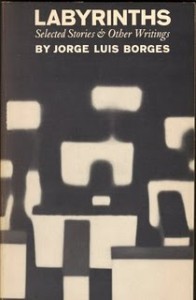“Tlön, Uqbar, Orbis Tertius” Jorge Luis Borges
 In my last post, I casually mentioned that when I first read The Age of Wire and String, I wasn’t very familiar with the precursors that had ‘made it possible’ as a book. Of course, I’m not sure exactly what earlier books helped Marcus write it, nor do I really know what it means to really ‘make a book possible.’ Instead, I think I meant that I hadn’t yet read writing that gave me a way of better appreciating The Age of Wire and String. My first reading of that book was really exciting, but difficult; I felt lost quite a lot through that book the first time. I felt that the book was isolated–and isolated me–when I first read it, but now that I’ve read some other stories and books, I think I feel comfortable putting it in a group of others that I feel do similar things to me as I read.
In my last post, I casually mentioned that when I first read The Age of Wire and String, I wasn’t very familiar with the precursors that had ‘made it possible’ as a book. Of course, I’m not sure exactly what earlier books helped Marcus write it, nor do I really know what it means to really ‘make a book possible.’ Instead, I think I meant that I hadn’t yet read writing that gave me a way of better appreciating The Age of Wire and String. My first reading of that book was really exciting, but difficult; I felt lost quite a lot through that book the first time. I felt that the book was isolated–and isolated me–when I first read it, but now that I’ve read some other stories and books, I think I feel comfortable putting it in a group of others that I feel do similar things to me as I read.
“Tlön, Uqbar, Orbis Tertius” is one of those stories that, for me, connects to The Age of Wire and String in a meaningful way. As I’ve mentioned before in some of these other posts, I had previously thought of stories as ABC tales of one character or another’s plights, such as “The Secret Life of Walter Mitty,” “To Build a Fire,” “The Most Dangerous Game,” etc., this next stage in my reading began to tune me into how words might be used for other purposes: world-building, for example.
Two years before I had discovered, in a volume of a certain pirated encyclopedia, a superficial description of a nonexistent country; now chance afforded me something more precious and arduous. Now I held in my hands a vast methodical fragment of an unknown planet’s entire history, with its architecture and its playing cards, with the dread of its mythologies and the murmur of its languages, with its emperors and its seas, with its minerals and its birds and its fish, with its algebra and its fire, with its theological and metaphysical controversy. And all of it articulated, coherent, with no visible doctrinal intent or tone of parody.
Finally, all Borges fiction collected. Like your kidneys, a local library, or a reliable bowl–this you need. [Edit–it has been out 10 years] [Edit–beer] [Edit, still read it, though.]
“I am more proud of the books I have read than the books I have written.” Jorge Francisco Isidoro Luis Borges Acevdeo


